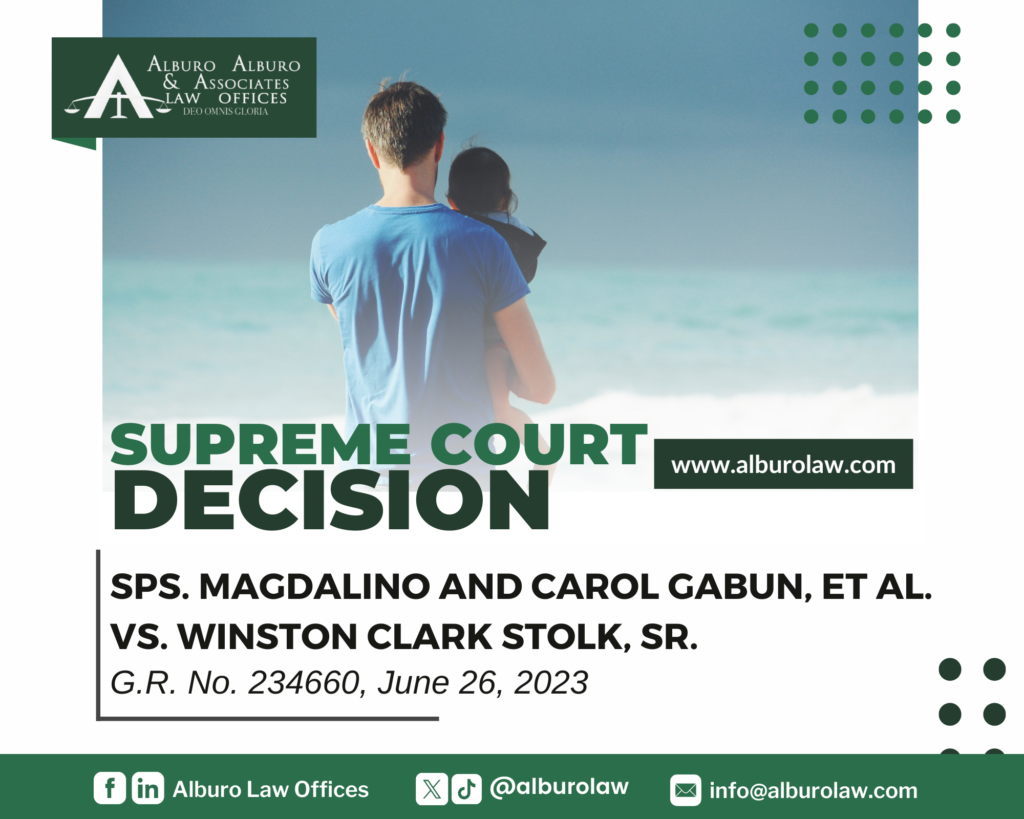(The case of Sps. Magdalino and Carol Gabun, et al. vs. Winston Clark Stolk, Sr., G.R. No. 234660, June 26, 2023)

Photo from Unsplash | Steven Van Loy
The following post does not create a lawyer-client relationship between Alburo Alburo and Associates Law Offices (or any of its lawyers) and the reader. It is still best for you to engage the services of a lawyer or you may directly contact and consult Alburo Alburo and Associates Law Offices to address your specific legal concerns, if there is any.
Also, the matters contained in the following were written in accordance with the law, rules, and jurisprudence prevailing at the time of writing and posting, and do not include any future developments on the subject matter under discussion.
AT A GLANCE:
In this case, since Catherine was not married to respondent, she had sole parental authority over her illegitimate son, Winston. After her death, custody was granted to Winston’s collateral grandparents under the Family Code. This substitute parental authority is not permanent and can be reviewed by the court, which must consider the child’s best interests.
Winston Clark Stolk, Sr. filed a petition for habeas corpus seeking permanent custody of his minor son, Winston Clark Daen Stolk, Jr. Respondent claimed that he and Winston’s mother, Catherine Alfonso Daen, lived together as a couple in Florida but were not married. Catherine returned to the Philippines in early 2007 to give birth, and she died shortly after giving birth to Winston on July 22, 2007. Petitioners, Nora and Marcelino (Winston’s collateral grandparents), were caring for Winston after Catherine’s death.
Respondent argued that petitioners were aware of his intention to take custody of Winston upon his arrival in the Philippines but blocked him from seeing his son. He also noted that the birth certificate listed him as Winston’s father.
A court-ordered DNA test, which respondent funded, confirmed a 99.9997% probability of paternity. This result was corroborated by the testimony of Dr. Raymundo W. Lo, the specialist who conducted the test. The case proceeded to a decision after respondent presented his evidence and petitioners provided their comments.
The issue in this case is whether or not the custody should be awarded to the respondent to which the Court ruled in the negative.
Under the Family Code, parents typically share joint parental authority over their children. For illegitimate children, the mother holds sole parental authority, even if the father recognizes the child. This authority includes custody, which the court will not alter unless the mother is proven unfit. If the mother dies or is unsuitable, custody may be granted to the surviving grandparents or other specified individuals.
In custody disputes, the child’s welfare is the primary concern. Factors considered include the child’s material and moral welfare, health, safety, and the environment best suited for their development. Additionally, the child’s preference is considered if they are over seven years old and capable of discernment.
In this case, since Catherine was not married to respondent, she had sole parental authority over her illegitimate son, Winston. After her death, custody was granted to Winston’s collateral grandparents under the Family Code. This substitute parental authority is not permanent and can be reviewed by the court, which must consider the child’s best interests.
The trial court’s ruling lacked sufficient analysis of factors such as Winston’s health, safety, and emotional well-being, as well as his preference and any potential detrimental conditions. This oversight indicates that the court did not fully address the essential factors required to determine the most suitable custodial arrangement for Winston.
Source:
Sps. Magdalino and Carol Gabun, et al. v. Winston Clark Stolk, Sr., G.R. No. 234660, June 26, 2023
Alburo Alburo and Associates Law Offices specializes in business law and labor law consulting. For inquiries regarding taxation and taxpayer’s remedies, you may reach us at info@alburolaw.com, or dial us at (02)7745-4391/0917-5772207.
All rights reserved.


